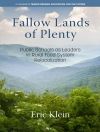Cities play a major role in tackling the COVID-19 pandemic as many measures are adopted at the scale of cities and involve adjustments to the way urban areas operate.
Drawing from case studies across the globe, this book explores how the pandemic and the policies it has prompted have caused changes in the ways cities function. The contributors examine the advancing social inequality brought on by the pandemic and suggest policies intended to contain contagion whilst managing the economy in these circumstances.
Offering crucial insights for reforming cities to be more resilient to future crises, this is an invaluable resource for scholars and policy makers alike.
Tabella dei contenuti
Introduction: Policymaking in the Face of Uncertainty and Inequality ~ Pierre Filion, Brian Doucet and Rianne Van Melik
Part 1: COVID-19 and Urban Changes
The Exaggerated Report of Offices’ Demise: The Strength of Weak Workplace Ties ~ Richard Shearmur, Manuela Parra-Lockhorst and Alastair Wycliffe-Jones
Platform Labour in Urban Spaces After COVID-19 ~ Sandro Mezzadra, Mattia Frapporti and Maurilio Pirone
More Cycling and Road Closures, but for Whom and Where? ~ Rebecca Mayers
Governing “The Night” in Post-COVID-19 Lisbon: Challenges, Opportunities and Uncertainties ~ Manuel Garcia-Ruiz, Iñigo Sánchez-Fuarros, João Carlos Martins, Cristiana Vale Pires and Jordi Nofre
Small Business Owners in Stockholm and the Anti-Lockdown Pandemic Strategy ~ Rosa Danenberg
Urban Inequalities and the Lived Politics of Resilience ~ Oleg Golubchikov and Geoffrey De Verteuil
Part 2: The Pandemic, Social Inequality and Mobilization
Navigating Socio-Economic Pressures in COVID-19 Urban Kenya: A Relational Geographies’ Perspective ~ Christiane Stephan, Mario Schmidt and Eric Mutisya Kioko
On Standby? But for How Long? The Impact of COVID-19 Lockdown Measures on the Urban Poor of Sri Lanka ~ Mohamed Minas, Dilshani N. Ranawaka and Lothar Smith
Combatting Older Adult Loneliness: It Takes a (Blended) Village ~ Maxwell Hartt, Samantha J. Norberg, Julie Karns, Maliha Majeed and Barry Pendergast
Kindness More Contagious Than Viruses: An Inclusive and Innovative Response to Inequalities in Ankara ~ Özgür Sayın and Savaş Zafer Şahin
Resisting Disaster Capitalism During COVID-19 in Chile: People Fight Back ~ Claudia González-Muzzio, Vicente Sandoval and Carmen Paz Castro
Rapid Deployment of Transport Infrastructure and Urban Social Injustice: The Case of Medellín, Colombia ~ Carlos Cadena-Gaitán, Alejandro Álvarez-Vanegas and María C. Flórez-Munoz
Part 3: Municipal and Urban Policy Responses
Transnational Experiences of COVID-19: Transferable Lessons for Urban Planning Between the Global South and the Global North ~ Shauna Brail, Michael Martin, Jagath Munasinghe, Rangajeena Ratnayake and Julie Rudner
Urban Mobility, Working Culture and Administration During the COVID-19 Crisis: Adjustments for a Resilient City ~ Kerstin Stark, Julia Schuppan, Ariane Kehlbacher, Julia Jarass and Laura Gebharbt
Public Transport Qualities and Inequalities in Pandemic Times ~ Marcus Finbom, Wojciech Kębłowski, Wladimir Sgibnev, Louise Sträuli, Peter Timko, Tauri Tuvikene and Tonio Weicker
COVID-19 and the Creative City: Lessons From the UK ~ Jonathan Gross, Tamsyn Dent and Roberta Comunian
Urban Regional Planning Under the Pandemic: The Case of Oslo ~ Lars Böcker, per Gunnar Røe and Elling Oftedal
Distributing, De-Synchronizing, Digitilizing: Dealing With Milan Transport Inequalities in Post-COVID-19 Society ~ Paola Pucci, Giovanni Lanza and Bruna Vendemmia
The View From the Socio-Spatial Peripheries: Milan, Italy and Toronto, Canada ~ Lorenzo De Vidovich, Julian Iacobelli, Samantha Biglieri and Roger Keil
Conclusion: The Pandemic and Beyond ~ Pierre Filion, Rianne Van Melik and Brian Doucet
Circa l’autore
Rianne van Melik is Assistant Professor in Urban Geography at the Institute for Management Research (IMR), Radboud University, Nijmegen, the Netherlands.












